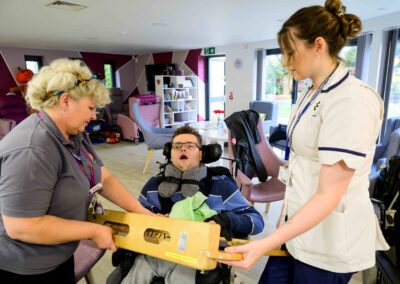How hospice care helped one family cope
Continuing with our look at hospice care week, we see how a combination of care at home and in the hospice helped one man get the best from his life.When St Elizabeth Hospice launched its new manifesto last year, its aims were to address the misconceptions about hospices which still exist today, and to encourage people to step over the threshold and see first-hand the warm, welcoming atmosphere. Sadly many people still believe that admission to the hospice means they will never go home, and therefore people are often reluctant to ask for hospice support, but this is a myth that the hospice is keen to dispel.Early contact with the hospice generally means that patients will get more benefit from the treatments available, which is why the hospice encourages people ask for help sooner rather than later. One patient’s daughter told us of the improvement she saw in her dad after his admittance to the in-patient unit and then being cared for at home before his death.Lester Frenzel was a strong stoic man. He was well known locally having owned a toy shop in Ipswich for many years and after his retirement took up breeding chickens.Lester was diagnosed with prostate cancer, but with treatment he carried on with life as normal for 12 years, until during a routine appointment at the hospital he was told there was nothing further they could do for him.Lester’s daughter Deborah said: “After hearing of our situation a family member suggested that we contact St Elizabeth Hospice for support, which we did and that’s when the magic started!The hospice doctors adjusted dad’s medication; it was such a relief to know that he was receiving specialist care. Dad continued to go for regular check-ups at the hospice for the next four years.”Shortly before Christmas in 2016 Lester collapsed, and he was admitted to the hospice. Deborah continued: “For the two and a half weeks that dad was in the in-patient unit, the care he received was exceptional and I think he actually enjoyed it.The hospice gave dad a chance to relax; he knew that if he had a pain the medical team were on hand to deal with it. After months of having virtually no appetite and refusing his dinners, dad started to really enjoy the hospice meals.They arranged physiotherapy and taught him and my mum how to use his wheelchair, so they were well prepared to deal with his reduced mobility. When the time came for him to be discharged, the hospice had already organised a hospital bed, wheelchair and commode to be set up in their home. Literally nothing was overlooked, the hospice community team visited dad once a day to check he was okay and shower him.”Once back at home Lester continued to enjoy his love of animals and even began breeding guinea pigs.One evening in February, Lester became really agitated couldn’t be settled. Deborah Said: “We called the hospice and they sent out two community nurses to visit us. When they arrived they could see how disorientated he was; he’d not been eating and was very weak, so they cleaned him and made him more comfortable. I’ll never forget how the nurses sat with us that night, explaining that it was time for us to say good bye. It was 1am by the time they left.”Lester died peacefully at home the following morning.Deborah summed up what support from the hospice meant for her dad and their family: “Without St Elizabeth Hospice, I honestly don’t know how we would have coped for the final years of dad’s life. The care they provided was completely tailored to my dad’s needs, allowing him to make the most of his life and continue to do the things he enjoyed, like caring for his animals and spending time in the garden. I’m so grateful for all the advice and reassurance they gave us, and I think it’s wonderful that the hospice made it possible for my dad to stay in the comfort of his own home until the very end.”



